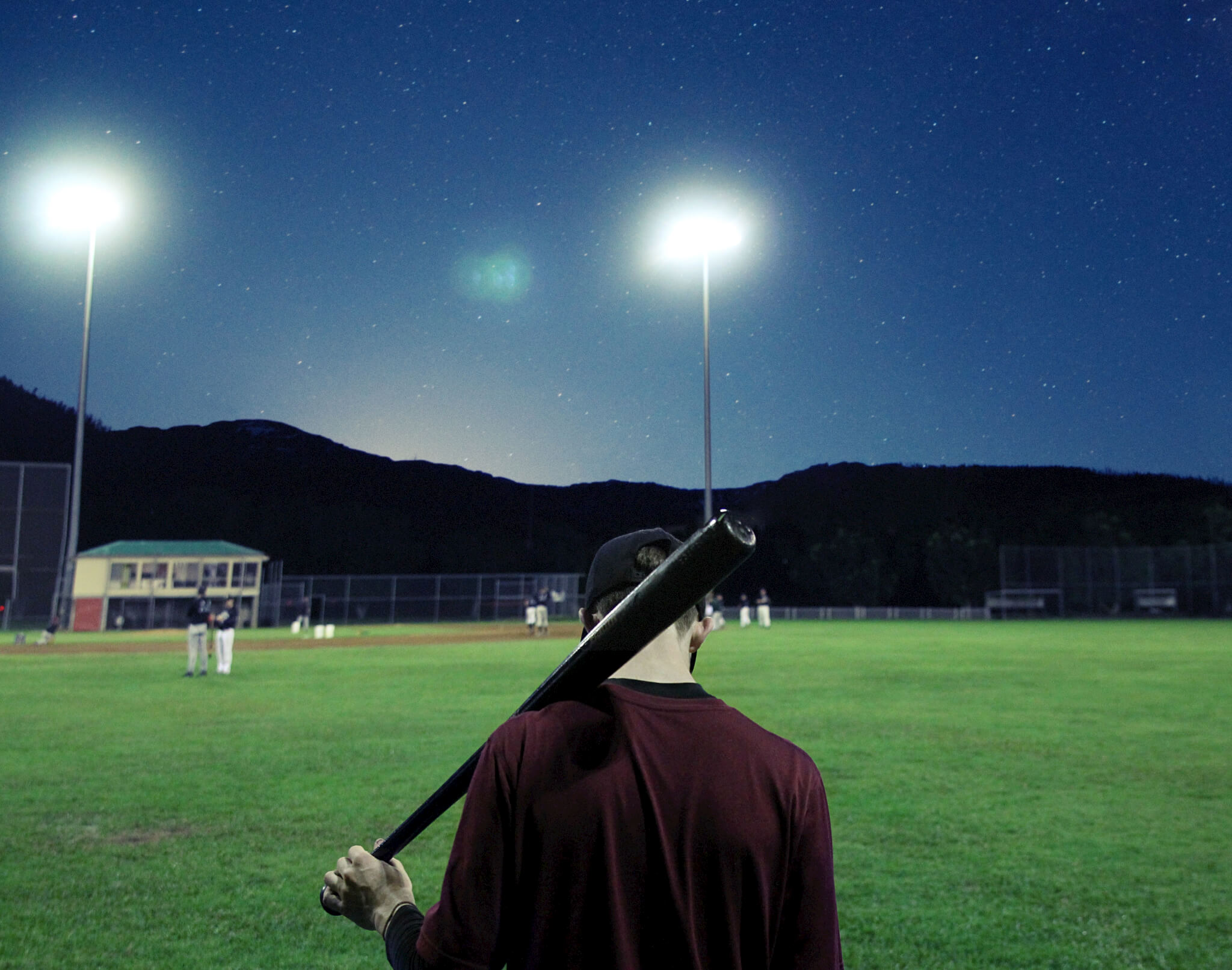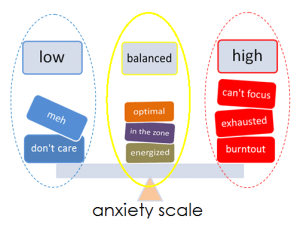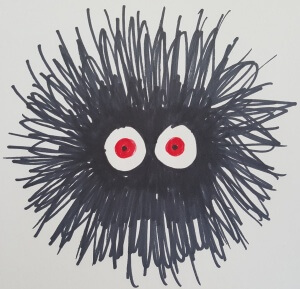 Anxiety and performance have an interesting relationship; and like any relationship – sometimes they work together like a well-oiled machine.. and sometimes they create chaos and discomfort.
Anxiety and performance have an interesting relationship; and like any relationship – sometimes they work together like a well-oiled machine.. and sometimes they create chaos and discomfort.
Often anxiety and performance trigger each other – setting off a hectic, frenzied, spiral.
I see it with my clients… and I’ve been there myself.
My anxiety and performance story
Many years ago before I found my career path – I was heavily involved in a particular sport that I loved. I was hooked on it, and I excelled at it. I learned the techniques quickly, and the more I practiced the better I got. In training I did really well, and rocketed up the ranks. My instructor pushed me to participate in tournaments on a regular basis.. eventually I agreed.
In the days leading up my first tournament, what started as excitement shifted to anxiety and terror. I had visualizations of crashing and burning in front of my instructors and everyone I trained with. I was so convinced that I was going to be an utter and complete failure, and embarrass myself beyond anything I had ever experienced – that I lied to all of my friends and family, giving them the wrong day and time so they wouldn’t be there to watch me. I couldn’t bear the thought of having all of them witness this impending disaster that I was sure was inevitable.
I could barely train, I couldn’t sleep, I couldn’t eat. I was a mess.
On the day of all I could do was drink my nutritional supplements and hope against all hope that I not throw up in front of everyone. I was sure that everyone could see how nervous I was as the tournament day got started. I heard them call my name, it was my turn, I was up. My heart was pounding, the room was spinning, and then the bell rang… I completely blanked.. for about half a second. Then something switched…I got a sort of tunnel vision, everyone else seemed to disappear except for my opponent (and occasionally the referee).
I did’t throw up, I didn’t crash and burn, I did’t make a complete and total fool of myself…
I won the first match.. and the next.. and the next.
I look back now, and think.. wow, what a waste.
I nearly let anxiety rob me of something that was really important to me. And yes.. my friends and family were royally ticked that I didn’t let them come watch.
The anxiety and performance problem
Anxiety consumes so much energy, so much mental concentration and focus… we want to win and excel so badly, we become so overwhelmed with it that we end up creating (or almost creating) the very thing we don’t want.
Now imagine what would happen if we could somehow channel that energy, concentration and focus into our performance? Our tournaments? Our exams?
What if we didn’t have to go through all the sleepless nights, the made up scenarios of catastrophic outcomes, and the crushing self-doubt? What if we could channel that energy, concentration and focus way earlier?
What if we could?
We can.
I am asked on a regular basis, “how can I get rid of this anxiety?” or “how do I control my anxiety?”
The answer is, quite simply “you don’t.. and as a bi-product, you will”.
Sounds confusing, I know..
First let’s take a look at anxiety.
Anxiety is a necessary emotional state. Think about it. If no one ever experienced any anxiety, nothing would ever get done. In fact, the human race probably wouldn’t be around either – our cave-men and cave-women ancestors wouldn’t have been worried about the saber-tooth tiger that might be waiting behind that tree to eat them. So they wouldn’t have bothered to be careful or keep themselves safe. Humans would have all ended up being nothing more than easy and convenient snacks.
Anxiety can keep us motivated, help us stay alert, keep us safe, and energize us.
It’s easy to spot the things that are important to us, as they usually have some degree of anxiety involved. However, when that anxiety gets too high it makes it hard to concentrate, it exhausts us, we feel burnout and panicky, our minds race –it feels like it’s impossible to accomplish anything. The smallest stressors become overwhelming, we can’t sleep, we can’t eat, and it feels like the whole world is about to crash down on top of us.
With too little anxiety, we have no motivation, no drive, and we just don’t care.
The key is to find the balance.. where anxiety and performance meet and get along. The place where anxiety motivates and energizes us, amps us up, sharpens our focus, and increases our confidence and determination. (see ‘anxiety scale’ below)

If we use my own experience as an example: my anxiety was clearly on the “high” end of the anxiety scale for the entire time leading up to the tournament. Unfortunately, I didn’t find my way to the “balance” zone until about 0.5 seconds after that bell rang… but at least I found it.
Get to the balance
Many people ask me how to get out of the “low zone”, and increase their motivation and stop procrastinating. I’m not going to go into that here, as it’s a whole other issue that I’ll save for another day. For now, the focus is on how to shift from the “high zone” to the “balanced zone”.
When we’re in the “high zone”, anxiety is like a little, greedy, monster that loves to feed itself. So it stirs up all sorts of nasty, disastrous, panicky thoughts – it’s favourite food – to keep itself going. For me, anxiety stirred up very realistic thoughts and images of me bombing my tournament, throwing up in front of everyone, and generally making a fool of myself. Because I paid attention to these thoughts, believed them all to be true, my anxiety monster had lots and lots to feed on… the more it fed, the stronger it got.
So is there a way to make the anxiety stop? Not really.. not directly. The more you try to force the anxiety to stop ‘feeding’ or calm down, the stronger it’s going to get.
Think about how you usually respond when anxiety shows up. Some people will avoid the very thing that’s important to them to try and avoid the anxiety (for example: someone who experiences social anxiety may avoid going out with friends, or going to parties), others may try to think the anxiety away, getting all caught up in the anxious thoughts, picking them apart, ruminating with the intent to find something that will make the anxiety go away. Some people shut down or try to ‘numb out’, others distract (usually in unhealthy ways with unhealthy things).. there are lots of ways we try to get rid of, and control, anxiety.
Ask yourself – do any of these things work? Sure they may work in the short term, for a few moments.. but do they work in the long term? Or does the anxiety always seem to come back, often stronger than before?
The answer is usually yes.
What to do instead
Accept it. Seriously.
You’ve tried everything else… clearly you cannot get rid of it. If you could – you would have done it already.
The fact is you cannot control an emotion. No matter how hard you try, you cannot control anxiety. The more you don’t want it, the more you got it.
BUT you can control how you respond to it – which can drastically change how it’s impacting your life. When we focus on changing how we react to it, rather than focusing on trying to get rid of it – the anxiety will go away on its own.
Anxiety is like that unwanted house guest.. the more you try to push them out the door, the longer they stay. So just accept that anxiety is in your house for now. Don’t fight with it, don’t try to change it, don’t listen to it.. instead just let it be.. you don’t have to like it, just let anxiety just hang out in your house. Now, you can turn your energy and attention to the things that are important to you. Once you do that.. anxiety will show themselves out.
I realize it’s easier said than done. Here I am suggesting that you suddenly change from fighting something, to accepting it. It’s a big switch that takes practice, and trying different techniques.
What to try
These are just a few of some of the many techniques and tools I suggest to my clients:
- When you notice that anxiety has shown up, tell yourself “I feel anxious.. that’s alright”. By doing so you’re going to do a couple important things. First: by recognizing that you FEEL anxious, you’re acknowledging it’s just a feeling. Often we say “I’m anxious”… well.. that’s not true. Your name is not “anxious”, it’s not who you are, it’s something that you’re feeling. That’s it. Secondly: you are accepting that this is how you are feeling right here and right now. Congratulations, you just accepted anxiety.
- Visualize making some space for it. You know that trying to shove anxiety out the door doesn’t work. So instead, take a deep breath and visualize making a little room for it. Like a child throwing a temper-tantrum on the floor in the middle of a grocery store – give him time and space and he’ll calm down. If you crowd him, demand that he relax, and try to control him.. he’s going to kick up even more of a fuss, and the tantrum will get louder, and will go on and on and on.
- Practice giving yourself a mental ‘time out’ everyday, even for just a few minutes. Find a spot that is all yours, quiet and comfortable, with minimal external distractions. Some people will do this practice in their bedroom, on their couch, or even in the shower if they live in a busy household. Close your eyes and take long deep slow breaths, and focus all your attention on your breath going in and out. Remember that distractions are normal. Notice that your mind brought you a thought, just notice it without judging it or spending time with it, and then notice your breath again. If you have to redirect your attention back to your breath a thousand times, that’s okay.
- Draw your anxiety. By doing so you shift your perspective of anxiety, and are accepting that this uncomfortable little monster exists, and it is separate from yourself. You also give yourself a handy tool to help identify which thoughts are actually just anxiety thoughts. It’s easier to recognize which thoughts are coming from this hungry little monster, so you can instead focus on the thoughts are actually helpful and useful. When a client struggles to visualize their anxiety, or give it shape, I direct them to the work of an artist by the name of Toby Allen who has created illustrations of emotional and mental struggles, in the form of ‘monsters’ (you can find his anxiety monster here).

My client’s anxiety monster (used with permission)
A couple ‘add-on’ tools, specifically for anxiety and performance situations:
- After noticing and accepting that anxiety is here. Notice those nasty thoughts it’s bringing you, and take a step back from them. Take a deep breath and focus on the “here and now”. Notice that anxiety is trying to get you to focus on the future, it’s trying to get you to focus on the outcome – and that’s not helpful, nor is it important right now – we can think about the finish line when we are at the finish line. Your energy and focus is required here, in the present moment.
- Visualize that picture above of the anxiety scale. Breathe deep and focus on the middle. Many of my clients will say out loud “find the balance find the balance” as they breathe and visualize themselves successfully moving themselves to the middle of that scale.
- In practicing any of above – add your sport to it. For example, when your mind brings to you a distracting thought visualize yourself throwing it to the side (if you play baseball or basketball), visualize tapping it into the goal (if you play hockey), or gently lobbying it over the net (volleyball, tennis, or badminton). The action is not an aggressive one, and you’re not getting rid of the thoughts (you don’t throw the ball or puck away do you?) you’re just using the skills you’ve already got to move this distraction out of your way.
Remember that tools and techniques that work for one person, may not work for another –this is a process that takes lots of practice. The options are endless, and finding what works best for you can take time; however, if you find that you are struggling to figure that out – you may want to consider meeting with a counsellor who can help.
 Joy Sereda is the Clinical Director of the Summit Counselling Group. She is both a Registered Clinical Counsellor and a Registered Social Worker; she primarily uses Acceptance and Commitment Therapy in her practice. You can read more about Joy, and all of the Summit counsellors on their bio pages.
Joy Sereda is the Clinical Director of the Summit Counselling Group. She is both a Registered Clinical Counsellor and a Registered Social Worker; she primarily uses Acceptance and Commitment Therapy in her practice. You can read more about Joy, and all of the Summit counsellors on their bio pages.
Summit Counselling Group is made up of eight, professional, and compassionate Registered Clinical Counsellors. We work with individuals, couples, adults, children, adolescents, and families at our executive West Broadway office in beautiful Vancouver, B.C.

